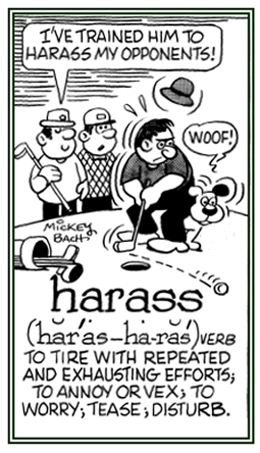You searched for:
“harasses”
harass (verb), harasses; harassed; harassing
1. To persistently annoy, to attack, or to bother somebody: Mary's little sibling is always harassing her to play games.
2. To impede and exhaust an enemy by attacking repeatedly or with repeated raids: The military troops continued to harass the entrenched rebels who were hiding in caves.
3. To irritate or to torment persistently: Jillian watched the small bird as it continued to harass the large crow that was flying over the garden.
4. To wear out; to exhaust: Janine was harassed by all the demands of her new job and she felt totally exhausted by the end of the first week.

© ALL rights are reserved.
Go to this Word A Day Revisited Index
2. To impede and exhaust an enemy by attacking repeatedly or with repeated raids: The military troops continued to harass the entrenched rebels who were hiding in caves.
3. To irritate or to torment persistently: Jillian watched the small bird as it continued to harass the large crow that was flying over the garden.
4. To wear out; to exhaust: Janine was harassed by all the demands of her new job and she felt totally exhausted by the end of the first week.
Just about everyone has been harassed at one time or another, and at such times it may seem that each individual is being "hounded" unmercifully by those who oppose them.
5. Etymology: from French harasser, from which harass is derived and which has the same range of meanings as its English counterpart, and it is derived from the Middle French harer, meaning "to set a dog on".This verb is derived from Old French hare, a cry used to encourage hunting dogs during the chase.
Although hare is of Germanic origin, akin to Old High German hara, hera, "hither", and hiar, "here"; its specific origin seems to be unknown.

Go to this Word A Day Revisited Index
so you can see more of Mickey Bach's cartoons.
This entry is located in the following unit:
English Words in Action, Group H
(page 2)
To continually annoy, to attack, or to bother other people by irritating or tormenting them. (1)
This entry is located in the following unit:
Word a Day Revisited Index of Cartoons Illustrating the Meanings of Words
(page 41)
